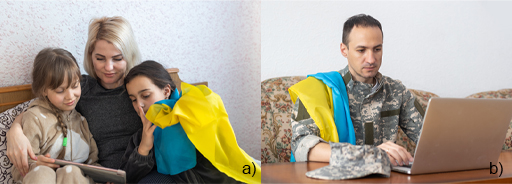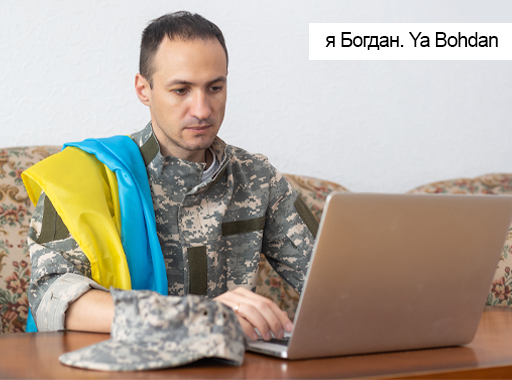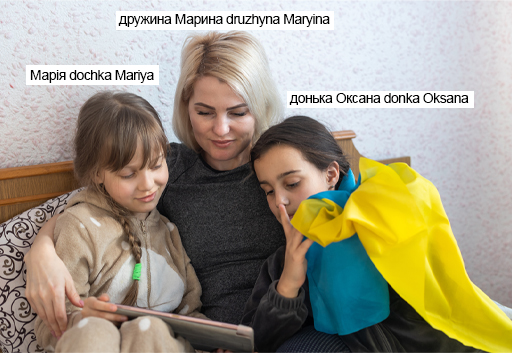1.2 Mariia and her family
Now let’s find out about another family. As with the previous activity, you can listen to the audio and read what Mariia says in Ukrainian or transliteration.
Transcript: Audio 3
| Ukrainian | Transliteration |
|---|---|
| Це я. Мене звуть Марія. Я школярка. Це Оксана, моя сестра. Вона теж школярка. Це наша мама, її звуть Марина. Вона учителька. На фото наш тато Богдан. Він програміст, але зараз він солдат. Він зараз в Україні, а ми – мама, Оксана і я – в Англії. | Tse ya. Mene zvut Mariia. Ya shkoliarka. Tse Oksana, moia sestra. Vona tezh shkoliarka. Tse nasha mama, yii zvut Maryna. Vona uchytelka. Na foto nash tato Bohdan. Vin prohramist, ale zaraz vin soldat. Vin zaraz v Ukraini, a my – mama, Oksana i ya – v Anhlii. |
Now Mariia’s father Bohdan describes his family. Listen and read in Ukrainian or transliteration.
Transcript: Audio 4
| Ukrainian | Transliteration |
|---|---|
| Я Богдан. Це моя сім'я - дружина Марина та мої діти: дочка Марія і донька Оксана. Зараз вони в Англії. | Ya Bohdan. Tse moia simia – druzhyna Maryna ta moi dity: dochka Mariia i donka Oksana. Zaraz vony v Anhlii. |
Transcript: Audio 5
Take a closer look (Audio 5 transcript)
In this short audio Bohdan talks about his family. He introduces himself in the basic way: Ya Bohdan (‘I am Bohdan’) and then introduces his wife and kids: Tse moia simia – druzhyna Maryna ta moi dity: dochka Mariia ta donka Oksana. (‘This is my family – my wife Maryna and my children: daughter Mariia and daughter Oksana’).
Let’s look at this sentence closely. First let me explain one difference between English and Ukrainian grammar. English speakers really like using possessive pronouns (words my, your, his, her, our, their) and it sounds obligatory for an English person to say ‘He put his hand into his pocket’. Since it’s not quite common for decent people to put their hands into someone’s pockets, Ukrainians don’t use possessive pronouns when it is not necessary. So, instead of saying ‘He put his hand into his pocket’ a Ukrainian person will normally say ‘He put a hand into a pocket’. It helps to avoid unnecessary words in sentences and sometimes – repetition of the same word in one sentence.
Let’s return to the text. Bohdan says: ‘Tse moia simia – druzhyna Maryna ta moii dity’ (‘This is my family – wife Maryna and my children’). Bohdan could also say: ‘Tse moia simia – druzhyna Maryna ta dity’ (‘This is my family – wife Maryna and children’). Possessive pronouns have gender and plural forms in Ukrainian, and we can see ‘my’ in feminine and plural forms: ‘moia’ (feminine) and ‘moii’ (plural). Please repeat these forms after me: ‘moia’_____, ‘moii’ _______.
Bohdan talks about his children. He says moi dity, which means ‘my children’. One child is dytyna, please repeat with me dytyna. Plural – ‘children’ – is dity, please repeat dity. Once again: dytyna, dity.
Bohdan has two daughters. He calls them dochka Mariia ta donka Oksana. Here you hear two synonyms for ‘daughter’ in Ukrainian, both of them are used frequently: dochka and donka. Please repeat after me: dochka, donka.
Last sentence in the text is Zaraz vony v Anhlii (‘Now they are in England’). Let’s repeat together names of Ukraine and England: Ukraina, Anhliia.
Activity 2: Look again
Now let’s look at the family again from Mariia’s point of view. Can you label the photo? Mariia is on the left, holding the tablet with the photo.



